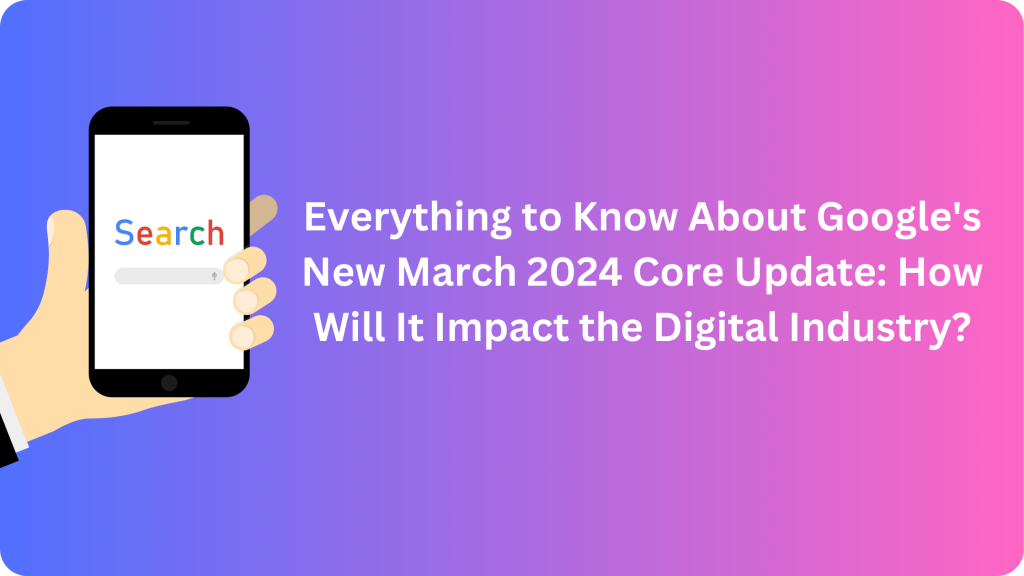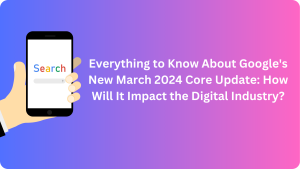The gossip about Google’s helpful algorithm update has yet to vanish, and Google has come up with another major update on March 5, 2024. This is the first CORE Update of Google in 2024.
Google is on a streak to improve its systems to support original, reliable, and people-first content and hunt unhelpful content. With this new major update, Google is continuing to do that.
However, methods of understanding such practices of abusing Google’s search rankings algorithms have been developed, this time based on other factors. That’s why the three new spam policies are at the forefront of this update.
In today’s blog, we’ll go through these three policies and talk about them in detail. Moreover, we’ll also look at the things most affected by this major core update, including spam and AI-generated content. So, without making a delay, let’s dive straight into it.
Google’s Core Update, March 2024
We have always seen Google developing new algorithm updates and trying to get on top of those not making content for people. There have been algorithms that shocked everyone when they came out. Moreover, their results were amazing as well.
However, we aren’t done praising those complex technologies yet, and Google has shared this update, which they say is more complex than their usual update. This update is made to have improved ranking systems. The three new spam policies, look at other factors to take action on websites instead of content.
While the aim of promoting helpful content is still the same with the Ranking Algorithm Update, Google, this time, has decided to pick and punch the manipulators hard. Yes, Google’s action this time will be very strict, leaving no room for compromises.
Let’s stick to the update’s content for now, but we’ll also be looking at the intensity of Google’s penalties as well.
Ranking Systems Update
First, Google has worked on its Core Rankings Systems to make them more effective. While there is no clear hint of how it works, unhelpful content and poor user experience are the factors that will be considered. It’s pretty much the same as last year, but Google has said it’s much more powerful this time. With this update and the ones that came in previous years, Google expects around a 40% reduction in low-quality, unhelpful, and unoriginal content to rank on top searches.
Google’s Three Latest Spam Policies
Let’s talk about the center of attention: the three new spam policies. These new spam policies are new, and the way they are intended to work is awesome. With these new policies for spam, Google wants to turn down the abusive practices of search engines that have developed recently.
It’s not new that people find new ways to manipulate the SERPs and top search results. Now, since they are manipulating the search results, it’s clear that they are doing it intentionally, and intend to rank higher on Google to attract footfall. So, in such cases, it can be assumed that there’s no helpful content present on such sites.
The workings of these new spam policy updates are similar, in that they track down a particular behavior and take it down based on that. However, to ensure that no decision is made on probability, the role of EEAT is still significant. But still, some experiences have been shared, which sounds like the cons of this update. We will get to them shortly, but first, let’s look at these three spam policies.
- Scaled Content Abuse
Google has always tried to track down practices where automation is used to create content in bulk. But, when it was started, the automation techniques were not very complex, so it was easy for Google to identify them. However, in its blog, Google has said that today’s automation systems are more advanced, (obviously hinting at AI) and are difficult to track.
That’s why there is a major update on such behaviors. So, not only those automation systems that are created for the sole purpose of reacting to a particular query and generating instant content to please that query are in danger, but those people who use AI to do so with little editing efforts will be affected.
And this is not made up or being speculated; Google itself mentions it. So, yes, a few recent technologies that were being praised will lose their significance, at least for abusing Google search results.
- Site Reputation Abuse
The second policy in the list is for those running a site with exceptionally great content. But if they are doing great, then what’s the fault here? There is a fault that such sites sometimes host content for others to make money. In such practices, the site owner earns money, and the one who shares the content earns traffic and viewers through the well-built reputation of the site.
So, it’s undoubtedly not a good practice if the content being shared on the reputed site has no value, is unoriginal, and is just to gain SEO benefits only. Google has identified this practice as Site Reputation Spam and is set to take strict action. However, for this particular policy, Google has given the owners of such websites two months to comply with it. Otherwise, action will be taken from May 5.
- Expired Domain Abuse
The last policy that Google shared was about domains. There is a practice of buying an expired domain and repurposing it to promote some other type of content to benefit from that domain’s authority.
For example, if a “.gov” domain has expired and has been bought by someone to share unhelpful and poor content about gambling, then it’ll be considered expired domain abuse.
Now, if you think about it, tracking such websites isn’t a big deal, and Google has finally come up with a solution too. So, soon, you can expect that no fraudulent website will appear.
These are the three spam policies that Google has introduced in its new update on March 5. All the policies sound great and have also started to roll out, so soon, there’ll be news about Google taking action as well.
However, News of actions through Digital Marketing individuals and agencies have already started to emerge for two out of three policies. So, let’s look at them now, but before that, let’s see what technologies are expected to be affected by this update.
What will be affected? Will AI lose its significance to Google Core Update 2024?
Now, let’s see what technical advancements will be affected by this update and to what extent. Two things are expected to feel thrust from these policies: Programmatic SEO and AI Content Generation.
- Programmatic SEO
For those who don’t know what programmatic SEO is, it’s an automation system that creates multiple landing pages for websites in a fraction of the time. The speed with which it works is unmatchable for a human, and that’s one factor Google uses.
But, other than this, the content is also a factor. In programmatic SEO, they target specific keywords, and when a search query comes with that keyword, they create a page that is focused on that particular keyword. So, it’s highly likely that the newly generated page will rank.
But where do things go wrong? Things go wrong when this practice is used to manipulate the search rankings. When the Programmatic SEO is set to come up with similar landing pages that answer the same questions but with minor differences in the use of keywords, ultimately, the internet is bombarded with unnecessary content pages that could have been merged into one.
If you look at the traditional SEO content creation method, keyword research is first done, and potential keywords are found. Then, the original and helpful content is created, implementing these keywords naturally, and we get a blog that’s not for Search engines but for real people.
However, it doesn’t mean that PSEO is wrong. If the database used in PSEO is big and diversified, and the algorithms can make very specific changes based on the query, then it’s of great use.
For example, if a search query comes to “10 places to visit in Goa except for beaches,” and the response comes exactly according to the query, like a listicle that doesn’t include any beaches, then it’s good.
- Artificial Intelligence
See, Artificial Intelligence is a breakthrough, and there’s no doubt about that. However, it also makes people frustrated, be it the people who are at risk of losing their jobs or agencies who are tired of telling their teams not to use AI because its content is terrible.
Thus, all the criticism AI has received is primarily from these sources. However, Google has a very neutral opinion on that, and the situation is the same with these new policies.
What changed then? The thing that’s changed is that Google has now made it clear what the use of AI is and what the abuse of AI is. It was previously clear when Google said, “promoting high-quality content, however, it’s produced,” but now people from digital marketing backgrounds can speak directly with no soft corner for AI use for abusing search results.
In simple words, you may have seen tutorials on video-sharing sites that you can create a blog in 60 seconds and similar claims. That’s what Google’s targeting this time. These partially false claims can now be criticized. But I said partially because even when you can create a blog in 60 seconds, its quality is totally trashy, and it includes as much helpfulness as you get “Makhan” in Dal Makhani.
These are the two things that will be affected by this new update. Additionally, the spam techniques will also be targeted, as we discussed above, but AI and PSEO are among the techniques that can be used in a good manner as well as to abuse rankings.
On the other hand, abusive practices like expired domain abuse are used primarily for spam. Now, let’s move toward the end of this blog with a discussion on the last thing: how is the implementation going?
The Implementation of Google Core Update March 2024
While full-fledged implementation is yet to be done when all the policies will be active, the effect of partial implementation of these policies has started to emerge.
While there is a lot of praise for deindexing spam AI sites, there are also some instances of accidental action. That’s why a question also arises about how efficient these new policies are at doing what they are made for. Let’s look at some industry gossip to understand the implementation so far.
- Deindexing in Core Update This Time
Jeff Coyle, a reputed name in AI marketing, shares on X that a bunch of sites are completely indexed, which were hosting spam content for the last one and a half years after the update rolled out. Some sites are also hidden in filter = 0 or settled down at the bottom of SERPs. Interestingly, such action is mostly taken manually and comes under the core update, but who knows if Google’s in the mood intolerance.
- Google’s Actions are not Gentle
Another post on X by a New York-based SEO expert reveals how fast and unexpected Google will be. She shares a post by Bruno D’Angelo that has named 10 websites that vanished from Google overnight. And these websites aren’t ordinary, as they used to get backlinks from 20 to 90 thousand.
- Google Will not Inform you of Any Penalty
A manual penalty by Google is notified in the Google Search Console, but since these penalties are automated, and no notification will be given to the website owner. So, you should check if this update hits your website by navigating “site:yourwebsite.com” on Google and see if it’s in the top results or not.
The confirmation of this news has come from Barry Schwartz himself. Barry writes, ‘Algorithmic updates are automated, and Google does not notify the site owner when an algorithm update negatively (or positively) impacts a site
- Is Google’s automation Accurate?
Now, between all this appreciation, there are some instances shared by industry people where the action was taken on sites that are not spam.
One incident is with Simranpal Singh’s website, which he has been running since 2013. If it occurred accidentally, this single case shows how Google may not be the perfect one. Let’s see how.
Firstly, Simranpal’s domain was brand new, so there’s no chance the “Expired Domain Abuse” isn’t the case. Then, the website used to rank well with sustainable traffic growth every year.
The content on the site was human-written, and even the images were not pirated; they mostly were owned screenshots. However, a manual penalty has hit Simranpal’s website, so it’s unclear if it’s a human error or the error caused by the new core update.
But according to Simranpal’s post on X, he isn’t alone, and many others received the same penalties from Google.
- To Google, Size Doesn’t Matter
If you think of not complying with the new update just because you have a small site, think twice. Pete Reynolds shared an incident that happened with his site, which has only 8 articles. However, “The content was 100% AI-generated informational content intended to warm up a website”, according to Pete. But to his surprise, he received a penalty for the site even when the size was so small.
Key Takeaways: Make It for Humans, By Humans
The vision of Google with this update is now clear to all. The fast and nonnegotiable actions are enough to say that it’s better to comply this time rather than find loopholes. What, as a business or website owner, can you do?
To start with, make sure to get your website audited so that you become aware of what exists on your site, whether it’s something recent or old. Get rid of any vulnerable element like content stuffed with keywords only, which fails in engagement and readability, or content that is written with AI without expert help or supervision.
Then, make sure that your domain is not among those that expire. Even if it’s, just ensure you are not doing expired domain abuse.
Lastly, keep in mind that the AI revolution that you are seeking is highly likely to be standing far. The last year may have made you think 2024 is just AI, but this Google update has made it all crystal clear.
You can use AI but for not core purposes like creative writing. Instead, use it for other purposes like outlining the blog. In totality, keep your content helpful, original, and user-centric.







